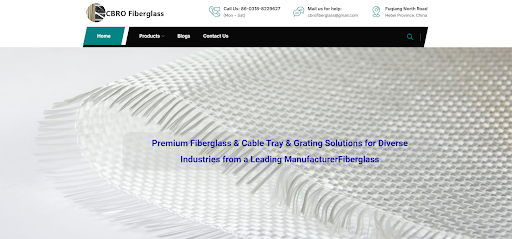To sign up for our daily email newsletter, CLICK HERE
In industrial environments, cable ladder systems are indispensable for organizing and securing cables, ensuring both efficiency and safety. Similarly, Chopped Strand Mat (CSM) is a fiberglass-based reinforcement material used in composite manufacturing to provide strength and durability. CSM is known for its versatility and plays a vital role in industries like automotive, marine, and construction, where durable materials are crucial for both functionality and longevity. Understanding the key properties of CSM is essential for selecting the right material for specific applications.

Properties of Chopped Strand Mat
Chopped Strand Mat (CSM) is a highly effective fiberglass reinforcement material with several critical properties that make it ideal for a broad range of composite applications. Its attributes such as strength, flexibility, and resin absorption make it a popular choice for various industries, ensuring that finished products perform well under both mechanical and environmental stress.
Durability
One of the most important characteristics of CSM is its durability. It is highly resistant to wear and tear, which makes it well-suited for use in applications exposed to frequent stress, impact, or friction. The fiberglass strands that make up CSM are designed to last, ensuring that the material maintains its structural integrity over time, even in demanding environments. The mat’s durability also extends to its chemical resistance, which allows it to withstand exposure to a wide variety of chemicals, oils, solvents, and other corrosive substances. This makes CSM ideal for use in applications where materials are exposed to harsh conditions, such as in the production of chemical tanks, automotive parts, and boat hulls. Whether used in marine environments or chemical processing plants, CSM ensures that composite structures remain reliable for long periods.
Flexibility
Another significant property of CSM is its flexibility. The fiberglass strands within the mat are randomly oriented, which gives CSM the ability to conform to a variety of complex shapes and curves. This flexibility makes it easy to use in molds or designs that require precise fitting or detailed shapes. CSM can be molded around tight corners or intricate contours without breaking or losing its reinforcement properties. This makes it ideal for use in applications where parts need to fit snugly into specific spaces, such as in automotive bodies, boat hulls, or custom composite components. The ability to easily shape and adapt CSM is an important advantage in many manufacturing processes, allowing designers and engineers to create products that meet complex design specifications.
Resin Absorption
The ability of CSM to absorb resin is a key factor in its effectiveness as a reinforcement material. The absorption of resin allows the fiberglass strands to bond with the resin, creating a strong and cohesive composite material. The open structure of the mat facilitates the absorption of various resins, including polyester, vinyl ester, and epoxy, ensuring that the finished product has an even and consistent layer of reinforcement. Proper resin absorption is essential to prevent weak spots or inconsistencies in the final product. By ensuring that the mat is fully saturated with resin, manufacturers can achieve a smooth, uniform surface and enhanced mechanical properties. This property is particularly important in industries like boat building, where the quality of the laminate plays a significant role in the performance and durability of the finished product.
Strength
CSM significantly improves the strength of the composite materials it is used in. The random orientation of fiberglass strands within the mat ensures that the reinforcement is evenly distributed throughout the composite material. This even distribution of strength increases the overall tensile strength and impact resistance of the finished composite, allowing it to withstand higher stresses without failing. CSM is used in a variety of applications that require high strength and performance, such as in the automotive industry for structural parts, in aerospace components, and in the production of heavy-duty equipment. The added strength provided by CSM ensures that the composite material can handle mechanical loads and resist damage, making it an ideal choice for products that are subjected to rigorous conditions. When combined with additional reinforcement, like fiberglass sheets, the overall strength and durability of the composite material are further enhanced, making it even more resilient to extreme environments and mechanical forces.
Thermal and Chemical Resistance
In addition to its mechanical properties, CSM offers excellent thermal and chemical resistance. Fiberglass, by nature, is capable of withstanding high temperatures without degrading, which makes CSM an ideal material for use in applications where heat resistance is required. For example, CSM is often used in the production of engine components or industrial machinery that are exposed to elevated temperatures. Furthermore, CSM’s chemical resistance ensures that it can be used in environments where the material is exposed to acids, alkalis, or other aggressive chemicals without deteriorating. This resistance to heat and chemicals extends the lifespan of the composite materials, ensuring reliable performance over time, even in harsh environments.